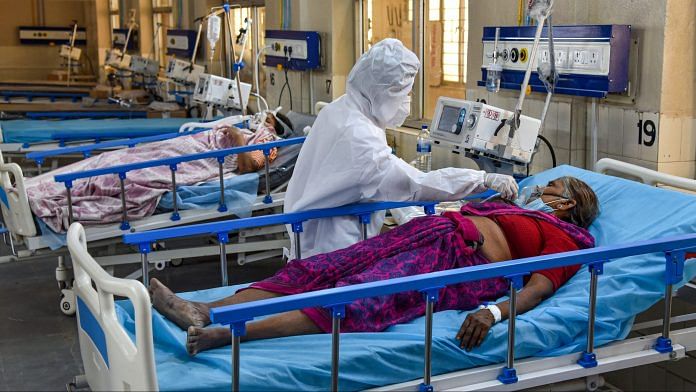
New Delhi: The Narendra Modi government has told top pharmaceutical companies to begin preparations for the third Covid-19 wave and keep stock of key drugs ready in the next two to three months.
In a meeting held Tuesday, the Department of Pharmaceuticals (DoP) — the apex regulator for drug makers in India under the Ministry of Chemicals and Fertilisers — asked pharma companies and lobbies to prepare stock of key Covid drugs, anticipating the third wave of the novel coronavirus.
The DoP also told companies to boost the production of liposomal amphotericin, the drug which is being used to treat black fungus infections, apart from boosting the production of antiviral drug remdesivir.
It also gave an option to “expedite the approvals” if any pharma firm wanted to start manufacturing amphotericin.
“We have been asked to create a stock of medicines, keeping the third wave of Covid in mind. The list includes all the medicines that have played a key role in the treatment of Covid patients,” said an industry source who was part of the meeting.
The drug makers will now draft a list of all key Covid medicines and their manufacturers in India and submit it to the DoP.
“The clear message to us from the government officials was to gear up the production and create a stock of medicines so that we are not caught napping when Covid makes a comeback,” the source said.
“The department has asked the industry to increase the availability of all Covid drugs in tier I, II, III cities along with equal focus on remote areas and villages.”
The virtual meeting was chaired by DoP secretary S. Aparna. Top industry lobbies, including Indian Drug Manufacturers Association, Federation of Pharma Entrepreneurs and Bulk Drug Manufacturers Association, participated.
These bodies represent India’s top drug makers such as Cipla, Lupin, Sun Pharma, Dr Reddy’s and Jubilant Life Sciences, and other small and medium drug firms.
Govt may look to opt for voluntary licensing for remdesivir
According to the officials, the production of remdesivir has gone up from 38 lakh vials per month to 119 lakh vials per month. However, India could also look at involving more drug makers or adding more units for the production of the drug.
“The department has ensured us that if there will be a requirement to boost the production of remdesivir even more, the discussions would be initiated with the Ministry of Health and Gilead, maker of the original product on the issue of voluntary licensing,” said a second official, who represented a pharma lobby at the meeting.
While liposomal amphotericin is now emerging as one of the key drugs in treating patients with steroids-induced mucormycosis (black fungus), it is manufactured by not more than six players in India.
A government official who was part of the meeting said on condition of anonymity, “We have been informed that the drug is manufactured by just 5-6 players in India while it is exported by around 12 companies. These exporters are not allowed to sell it here. We will be working on this concern.”
The official added, “The idea is to extend the possible hand holding to the pharma industry which is our backbone in this fight against Covid.”
The government will also explore options to discuss with patent holding companies, such as Gilead, to go for voluntary licensing with Indian manufacturers, the official said.
Concerns related to price rise will be taken care of, says DoP
The industry highlighted concerns over zooming prices of the raw materials and packaging costs, adding that in some cases the prices of bulk drugs have spiked by up to 200 per cent.
“We have been assured that the department of pharmaceuticals along with the drug price regulator, National Pharmaceutical Pricing Authority, will look into the price rise and update the industry on the possible scope of absorbing the hikes,” said the second official quoted above.
Subscribe to our channels on YouTube & Telegram
Why news media is in crisis & How you can fix it
India needs free, fair, non-hyphenated and questioning journalism even more as it faces multiple crises.
But the news media is in a crisis of its own. There have been brutal layoffs and pay-cuts. The best of journalism is shrinking, yielding to crude prime-time spectacle.
ThePrint has the finest young reporters, columnists and editors working for it. Sustaining journalism of this quality needs smart and thinking people like you to pay for it. Whether you live in India or overseas, you can do it here.